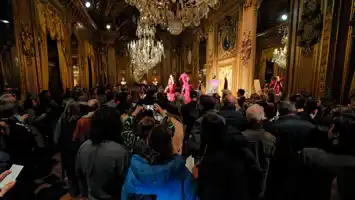Kulturnatt at the Opera
Open house in the dream factory

-
WHERE:the Opera House
-
TIME:6 p.m. till midnight
-
FEE:free entrance!
Welcome to the Royal Swedish Opera on April 26, 2025 - between 6 p.m. and and midnight we offer you a packed programme - as usual!
The Culture Night 2025
Welcome to the Culture Night (Kulturnatten) at the Royal Opera. Here you can experience all the art forms that fit within our opera house – no fees, and just come and go as you please. If you have any questions during the evening, look for our employees who can guide you correctly and answer questions.
Food, Bars & Bubbly
In the evening, you can enjoy food and drink at the Grodan Restaurant, in the Golden Foyer and the Cocktail bar on the 1st balcony, on our terrace and in the café on the stalls level. From three-course dinners to bubbly and snacks!
Bags
During Culture Night, no bags larger than A4 are allowed into the Opera House. This is due to the police ban on bags at major events. Please note that there is no cloakroom outside the Opera House.
Special offer during Culture Night
Get up to 50% discount on opera and ballet with our Culture Night offer!
Programme 2025
WELCOMING TONES
TIME 6–6.20, 7–7.20, 8–8.30, 9–9.30, 10–10.45 p.m.
WHERE Main entrance
Musicians from the Royal Swedish Orchestra will play classical music in the entrance hall.
VIOLIN Agnieszka Swigut
VIOLIN Anna Petry
VIOLA Jakob Ruthberg
CELLO Mirjam Pfeiffer
COSTUME FITTING FOR CHILDREN
TIME 6–9 p.m.
WHERE 2nd row balcony
Here children of all ages can dress in exciting creations designed for performances at the Royal Swedish Opera.
CRAFT CORNER FOR CHILDREN
TIME 6–9 p.m.
WHERE Lower 3rd row balcony
Learn more about the Royal Swedish Opera's wig and mask department. Create imaginative character art with makeup cards and discover the web series The Magical House (in Swedish only).
TRY ON POINTE SHOES
TIME 6–10 p.m.
WHERE Upper 3rd row balcony
Here, both adults and children have the opportunity to try on pointe shoes. If you also make a donation to the Pointe Shoe Appeal, you will receive a pair of shoes signed by the opera's dancers to take home!
TRY OPERA FOR CHILDREN
TIME 6.30–7, 7–7.30, 7.45–8.15, 8.30–9 p.m.
WHERE Schweizeriet, lower 3rd row
CONDITIONS Limited number of participants per event, tickets can be collected from the box office at the entrance from 6 p.m. on the same day. First come, first served.
Here, children aged 6-10 years old can try out what it sounds and feels like to sing opera with the help of educators from Young Opera. Instructions are given in Swedish.
OPERA ON THE MAIN STAGE
TIME 6.30–7, 7.30–8 p.m.
WHERE Main stage
The opera's soloists and the Royal Swedish Orchestra perform highlights from Bizet's classic Carmen.
CONDUCTOR James Duddle
SOLISTERS Miriam Treichl, Jens Persson Hertzman and Magdalena Risberg
HOST Opera Director Tobias Theorell
OPERA SING-ALONG
TIME 7–7.30, 8–8.30, 9–9.30, 10–10.30 p.m.
WHERE The Golden Foyer
Get on your toes and sing along to beloved opera classics!
CONDUCTOR Jon Nilsson and Matilda Wahlund from the Royal Swedish Opera Chorus
PIANIST Gunnel Lundberg
TRY OUT MODERN DANCE AND BALLET
TIME 7–7.30 p.m. (modern dance), 8–8.30 p.m. (classical ballet)
WHERE The Studio, 3rd upper row
CONDITIONS Limited number of participants per event, tickets can be collected from the ticket office at the entrance from 6 p.m. on the same day. First come, first served.
Try classical and modern dancing under the guidance of repetiteurs from the Opera.
INSTRUCTOR (modern dance) Hlin Hjálmarsdóttir
INSTRUCTOR (classical ballet) Zhan Atymtayev with pianist Massimo Broggio
BALLET AND MODERN DANCE ON THE MAIN STAGE
TIME 8.30–9, 9.30–10.30 p.m.
WHERE The Main Stage
In Young Choreographers, dancers from the Royal Ballet step into the role of choreographers and lead their colleagues in short performances with different styles and expressions. Each part contains a mix of modern and classical dance.
PRESENTER Ballet Director Nicolas Le Riche
OPERA MASTERCLASS
TIME 9–9.30 p.m.
WHERE The Studio, 3rd upper row
CONDITIONS Limited number of participants per event, tickets can be picked up at the box office at the entrance from 6 p.m. on the same day. First come, first served.
Join in when the Opera's soloist Jeremy Carpenter as he guides soprano Klara Lindegren.
PIANIST Lars-David Nilsson
TRY SINGING OPERA
TIME 10–10.30 p.m.
WHERE The Studio, 3rd upper row
TERMS Limited number of participants per event, tickets can be picked up at the box office at the entrance from 6 p.m. on the same day. First come, first served.
Try singing opera under the guidance of educators from the Royal Swedish Opera.
PIANIST Olga Tomilina
SCREENING OF THE MAGICAL HOUSE
TIME 10.30–11.45 p.m.
WHERE The Main Stage
Watch our web series The Magical House (in Swedish only) about life behind the scenes at the Opera House. Suitable for curious people of all ages!
Young Choreographers playing order
-
First show (8.30–9 p.m.)
1. $€X | T@P£$ by Anthony Lomuljo/ Daniel Norgren Jensen
2. All that´s left unsaid by Lucy Hind
3. In the mood for tea by Rikako Shibamoto
4. Linger by Julien Keulen
5. Back End by Lorenzzo Fernandes -
Second show (9.30–10.30 p.m.)
1. X.O.R by Jérémie Neveu
2. Beyond Comfort by Celine Urquhart
3. Voices by Alice Hidalgo
4. In the mood for tea by Rikako Shibamoto
5. Angels last breath by Liepa Mikaliunaite
6. Back end by Lorenzzo Fernandes
7. Eucalyptus Marginata by Zane Smith-Taylor
8. Contagion by William Dugan
Lyrics for the Sing-Along
-
GIUSEPPE VERDI »Libiamo ne’lieti calici« from La traviata
Libiamo, libiamo ne’ lieti calici
Li-bjamå, li-bjamo ne li-jä-ti ka-li-tjiChe la bellezza infiora
Ke la-be-lätt-za in-fjå-raE la fuggevol, fuggevol ora
E la-a fodd-je-vål, fodd-je-vål å-raS’inebri a voluttà
Sinn-ebri-a vå-lo-å-taLibiam ne’ dolci fremiti
Li-bjam ne dål-tji-frä-mi-tiChe suscita l’amore
Ke su-shi-ta la-am-årePoiché quell’occhio al core
Påj-ke kväll-åck-i-å al kåreOnnipotente va
Å-ni på-tän-te vaLibiamo, amore, amor fra i calici
Li-bja-må, a-måre, a-mår fraj-ka-li-tjiPiù caldi baci avrà
Pjo kal-di ba-tjia-vraLibiamo, amore, amor fra i calici
Li-bja-må, a-måre, a-mår fraj-ka-li-tjiPiù caldi baci avrà
Pjo kal-di ba-tjia-vraTra voi, tra voi saprò dividere
Tra-våj,tra-våj sa-pro di-vi-de-reIl tempo mio giocondo
Il täm-på mi-å gjå-kån-dåTutto è follia, follia nel mondo
Tot-åe fåll-ia fåll-ia näll mån-dåCiò che non è piacer
Tjå ke-e nån e-pia-tjerGodiam, fugace e rapido
Gå-dijam, fo-ga-a-tje-ra-pi-dåÈ il gaudio dell’amore
Eijl gao-diå dä-äl-a-må-reÈ un fior che nasce e muore
E-jon fjå-r ke na-sje-e mo-åreNé più si può goder
Nä pjo si puå-å gå-därGodiam, c’invita, c’invita un fervido
Go-djam, tjin-vi-ta, tjin-vi-ta onn fäär-vi-dåAccento lusinghier
Atj-en-tå-å lo-o-sin-gjer -
GEORGES BIZET »Toreador Song« from Carmen
Toréador, en garde! Toréador! Toréador!
Tå-re-a-dår, a gar-dö! Tå-re-a-dår! Tå-re-a-dår!Et songe bien, oui, songe en combattant
E så-sjö biä, ou-i, så-sjö kå-bat-taqu’un oeil noir te regarde
kö-nöi nåar tö rö-garet que l’amour t’attend, Toréador
e kö la-mor tat-ta, Tå-re-a-dårl’amour, l’amour t’attend!
la-mor, la-mor tat-ta! -
GEORGES BIZET »Habanera (L’amour est un oiseau rebelle)« from Carmen
L’amour est un oiseau rebelle
La-mor et än-oa-zå rö-bel-löQue nul ne peut apprivoiser
Kö nyl nö pö-tap-priv-oa-zeEt c’est bien en vain qu’on l’appelle
E se biä na vä kå lapp-ell-öS’il lui convient de refuser
Sil lu-i kå-viä dö rö-fy-zeRien n’y fait, menace ou prière
Riän ny fä, mena-so priärL’un parle bien, l’autre se tait
Lön parlö biä, lå-trö sö täEt c’est l’autre que je préfère
E se lå-trö kö sjö prefärIl n’a rien dit, mais il me plaît
Il na riä di, mäs-il mö pläL’amour, l’amour, l’amour, l’amour
La-mor la-mor, la-mor, la-morL’amour est enfant de bohème
La-mor e-ta-fa dö bå-emIl n’a jamais, jamais, connu de loi
il na sja-me, sja-me, kå-ny dö loaSi tu ne m’aimes pas, je t’aime
Si ty nö mä-mö pa, sjö-tä-mösi je t’aime, prends garde à toi
si sjö-tä-mö, pra gar-da toa!Prends garde à toi
Pra gar-da toaSi tu ne m’aimes pas, si tu ne m’aimes
Si ty nö mä-mö pa, si ty nö mä-möpas, je t’aime
pa, sjö-tämPrends garde à toi
Pra gar-da toaEt si je t’aime, si je t’aime
E si sjö-tä-me, si sjö-tä-möprends garde à toi
pra gar-da toaL’amour est enfant de bohème
La-mor e-ta-fa dö bå-emIl n’a jamais jamais connu de loi
Il na sja-me, sja-me kånä-ny dö loaSi tu ne m’aimes pas, je t’aime
Si ty nö mä-mö pa, sjö tä-mösi je t’aime, prends garde à toi!
si sjö tä-mö, pra gar-da toa!Prends garde à toi
Pra gar-da toaSi tu ne m’aimes pas, si tu ne m’aimes
Si ty nö mä-mö pa, si ty nö mäpas, je t’aime
pa, sjö tä-mPrends garde à toi
Pra gar-da toaMais si je t’aime, si je t’aime
Mä si sjö tä-mö, si sjö tä-möprends garde à toi
pra gaaaaaaar-da toaaaaa -
GIUSEPPE VERDI »La donna è mobile« from Rigoletto
La donna è mobile
La dån-na-e må-bil-eQual piuma al vento
Koal pio-mal vän-tåMuta d’accento
Mo-ta-da-tjänn-tåE di pensiero
E di pänn-siä-råSempre un amabile
Sem-preon a-mabileLeggiadro viso
Ledd-ja-drå-vi-zåIn pianto o in riso
In pijan-tå-in-ri-zåÈ mensognero
E männ-so-njä-råLa donna è mobile
La dån-nae må-billQual piuma al vento
Koal pio-mal vän-tåMuta d’accento
Mo-ta da-tjänn-tåE di pensier
E di pänn-siärE di pensier
E di pänn-siärE di pensier
Eeee-eee-ee-di-pänn-siärÈ sempre misero
E säm-prä-mizeråChi a lei s’affida
Kia lej-saf-fidaChi le confida
Ki-le kån-fidaMal cauto il core
Mal kao-tå-il-kå-rePur mai non sentesi
Por maj nån sän-te-siFelice appieno
Fe-litj-ap-pije-nåQui su quel seno
Ki-so koäll-sä-nåNon liba amore
Nån li-ba-må-reLa donna è mobile
La dån-nae må-billQual piuma al vento
Koal pio-mal vän-tåMuta d’accento
Mo-ta da-tjänn-tåE di pensier
E di pänn-siärE di pensier
E di pänn-siärE di pensier
Eeee-eee-eeeeeeeeeeeeee-diii pänn-siäääääääär! -
GIUSEPPE VERDI »Va pensiero« from Nabucco
Va, pensiero, sull’ali dorate
Va, pän-sie-rå, soll-a-li då-ra-teVa, ti posa sui clivi, sui colli
Va, ti på-za soi kli-vi, soi kål-liOv olezzano tepide e molli
Åve-å-ledz-a-nå te-pi-de mål-liL’aure dolci del suolo natal
Laore dål-tji del so-å-lå na-talDel Giordano le rive saluta
Del Dzjår-da-nå le ri-ve sa-lo-taDi Sionne le torri atterrate
Di Si-ånn-e le tå-å-rri-att-err-ateO, mia patria, sì bella e perduta
Å, mi-a pa-tria si bel-lae per-do-taO, membranza, sì cara e fatal
Å, men-bran-tsa si ka-ra e fa-talArpa d’or dei fatidici vati
Ar-pa får dei fa-ti-di-tji va-tiPerché muta dal salice pendi?
Per-ke mo-ta dal sa-li-tje pen-di?Le memorie nel petto raccendi
Le me-må-rie nel pett-å ra-tscen-diCi favella del tempo che fu
Tji-fa-vel-la del tem-på ke foO simile di Sòlima ai fat
Å so-mi-le di Så-li-mai fa-tiTraggi un suono di crudo lamento
Trad-dji on soå-nå di kro-då la-men-tåO t’ispiri il Signore un concento
Å, tis-pi-ril Si-njå-re-on kån-tjen-tåChe ne infonda al patire virtù
Ke ne in-fån-dal pa-ti-re vir-toChe ne infonda al patire virtù
Ke ne in-fån-dal pa-ti-re vir-toChe ne infonda al patire virtù
Ke ne in-fån-dal pa-ti-re vir-toAl patire virtù
Al pa-tire-vir-to -
FRANZ Lehár »Mippen schweigen« from The Merry Widow
Mörkret lättar, kroppen hettar nära dig
Allt är möjligt inget löjligt nära dig
Sorg behöver glädje, ”Ja” behöver ”nej”
Så håll ut till slut, till slut jag älskar dig
Du har mig i ditt grepp
Jag ber dig: aldrig släpp
När valsen spelats klar jag viskar tyst:
bli kvar, bli kvar
Ingen gråt förutan skratt och ingen dag förutan natt
Att älska det är svårt, kom, håll mig hårt
Sorg behöver glädje, ”ja” behöver ”nej”
Så håll ut till slut, till slut jag älskar dig

Don't miss a single beat!
Did you know that our newsletter subscribers always get the latest information first? Stay up to date on upcoming productions, ticket releases and other news.
Subscribe to our newsletter →